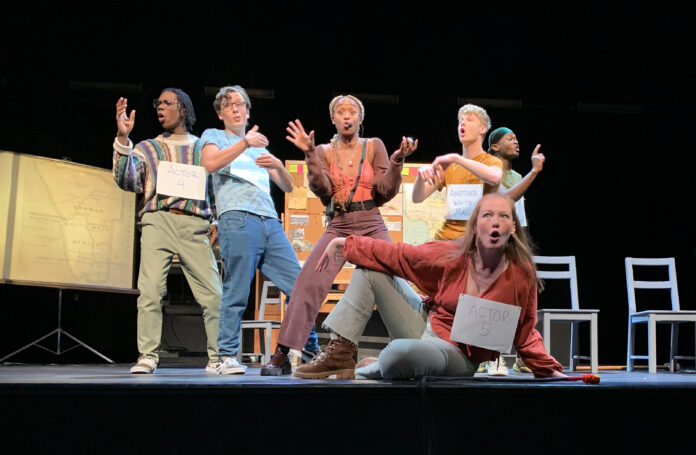“We Are Proud To Present A Presentation About the Herero of Namibia, Formerly Known as South West Africa, From the German Südwestafrika, Between the Years 1884-1915” by Jackie Sibblies Drury portrays the efforts of six actors as they tell the story of a period in history that they simultaneously know nothing and everything about: the Herero and Namaqua genocide at the hands of Germany. The play is a testament to how systems of oppression allow violence against Black and Brown bodies to continue for centuries, yet is also an urgent call for change and unity in the cause of dismantling systemic racism. Last weekend, “We Are Proud To Present…” hit the Muhlenberg stage as this semester’s first mainstage production, setting the example of what theater is capable of.
The cast and crew’s experiences working on “We Are Proud To Present…” reveal how much mental, physical and emotional safety was valued throughout the process. A multitude of resources were provided to support all those working on the production, including access to production counselors Ian Wagner and Aliya Kenyatta who were available on-site during several rehearsals and after all performances. The value that was placed on establishing trusting relationships between cast members as well as easing the cast in tackling some of the play’s most intense moments is also evident. They participated in a lot of group bonding activities such as dinners at director Nigel Semaj’s home, visiting assistant professor of theater and dance/directing, house, keeping up a light-hearted mood with vogueing and dance breaks and general discussions about their characters and the show within rehearsals. In addition, the cast also engaged in a “check in, check out” system with their fellow actors to get into the character’s mindset that they needed for the show and to leave that mindset behind when the run was over. This required the actors to check in and check out with each member of the cast by having a special dance or action that each pair would do before and after the show. Cast members also checked in and out with themselves with certain tactics such as making playlists or taking their own quiet time to reflect on their performances and the show overall.
“Don’t forget about this play. Don’t forget about the story. Don’t forget about the way that it makes you feel.
-Naava Wilson ’25
Participating in such a groundbreaking production has forever impacted all those involved with the piece, both onstage and off. Associate Director Elizabeth Muriel ‘23 said, “As an artist, I’m really interested in pieces of theater that serve the purpose of talking about anti-racism and seeking to inform people about things that they’ve never heard of before… this piece should make people angry. I think we should be angry about all of the things that we haven’t had the opportunity to learn or talk about, and all of the stories that have been censored throughout history.”
Chris Rubingh ‘24 portrayed Actor 3/Another White Man and said, “Uncomfortability is not a bad thing, especially in theater, and it’s that uncomfortability that pushes us and makes us see the truth in a lot of scenarios. Without being uncomfortable, we can’t always experience what we need to or what a playwright wants us to.”
Amira Jackson ‘24, who played Actor 6/Black Woman, said “people often think that Muhlenberg is this all-inclusive lovely college and to an extent it is, but there’s still things that need to be done. There’s also this idea of some people’s history being more important than others, that’s also something that, we need to work on as a college… we’re so uncomfortable with these ugly truths, and the more we run from them and the more we try to push them into the past, the more history is gonna repeat itself. If we don’t take that time to sit in that discomfort and put ourselves in situations that are going to be uncomfortable but will teach us something, then we can’t really be in a society where it’s equal and where race isn’t a factor in which we’re arguing about every single day.”
Jackson’s understudy, Naava Wilson ‘25, expressed her hopes for what Muhlenberg took away from this production, stating, “Don’t forget about this play. Don’t forget about the story. Don’t forget about the way that it makes you feel. I hope everyone feels something like anger, disgust or [discomfort]… I hope they ask questions about why we’re feeling like this, I hope they went home and looked up this genocide because I know some people were like, ‘Wait, is this a thing that actually happened?’” Although Wilson and the rest of the understudies are credited as understudies, they were able to perform during multiple performances, serving as more of a tandem process or swing.
Semaj, the driving force behind this production, introduced several students to “We Are Proud To Present…” by including the play in many of their class curriculums last semester, including Jackson’s directing class and Wilson’s “Dramatic Text in Action” class. Wilson expressed her appreciation for Semaj and their inclusion of this play in the curriculum: “They’re very big on teaching us texts by writers of color and queer writers and all of that stuff that we usually don’t get to see… it was like this insane play that was so good but also so frustrating.” Engaging with the material in classes made the two very familiar with the script and its significance, leading them to audition and to receive the roles of Actor 6/Black Woman and her understudy respectively. Those who were not in these classes also recognized how monumental the play was and the impact it would have on Muhlenberg audiences.
Elizabeth Vichness ‘25 who understudied Actor 5/Sarah, reflected on a conversation she had with Semaj recently, stating,“I was saying that I feel like in the past I’ve been doing theater just to do theater because I love to do it, and now I’m more interested in doing theater for a purpose, or theater for a cause. There’s nothing wrong with having fun shows, but I’m interested now in exploring what that looks like, especially in an educational setting.”
“As an artist, I’m really interested in pieces of theater that serve the purpose of talking about anti-racism and seeking to inform people about things that they’ve never heard of before…
-Elizabeth Muriel ’23
Sam McGuire ‘25, who portrayed Actor 1/White Man, was very attentive of the “check in, check out” process and stressed how important and beneficial it was to make sure other members of the cast felt safe. He said, “It was very moment to moment and a quick check in. You check in with your partner, it takes a second and then you are confident from there that what you’re doing is within the role of the play, and then you check out and that’s it.”
Another element of the production that shows the prioritization of the cast’s safety was the inclusion of a facilitation at the end in place of bows, giving both the cast and audience time to process and reflect on what just happened. In this facilitation, Semaj established the intent of this production and left the audience with the motivation to make a change with the statement, “We are in this together, liberation constitutes liberation for all of us, and if all of us are not in it, then none of us are in it. So let’s start the work here—today, tonight—to be a community and work to destroy the systems of oppression that are at work.”
Samantha Tempkin ‘25 is a theatre and media & communication double major and is thrilled to be joining the Weekly’s staff as an Assistant News Editor! She is also the co-president of KPC, Muhlenberg’s K-Pop club. When she is not writing for the paper, Sam loves singing, dancing, listening to music, seeing Broadway shows, watching Marvel movies, and hanging out with friends!























